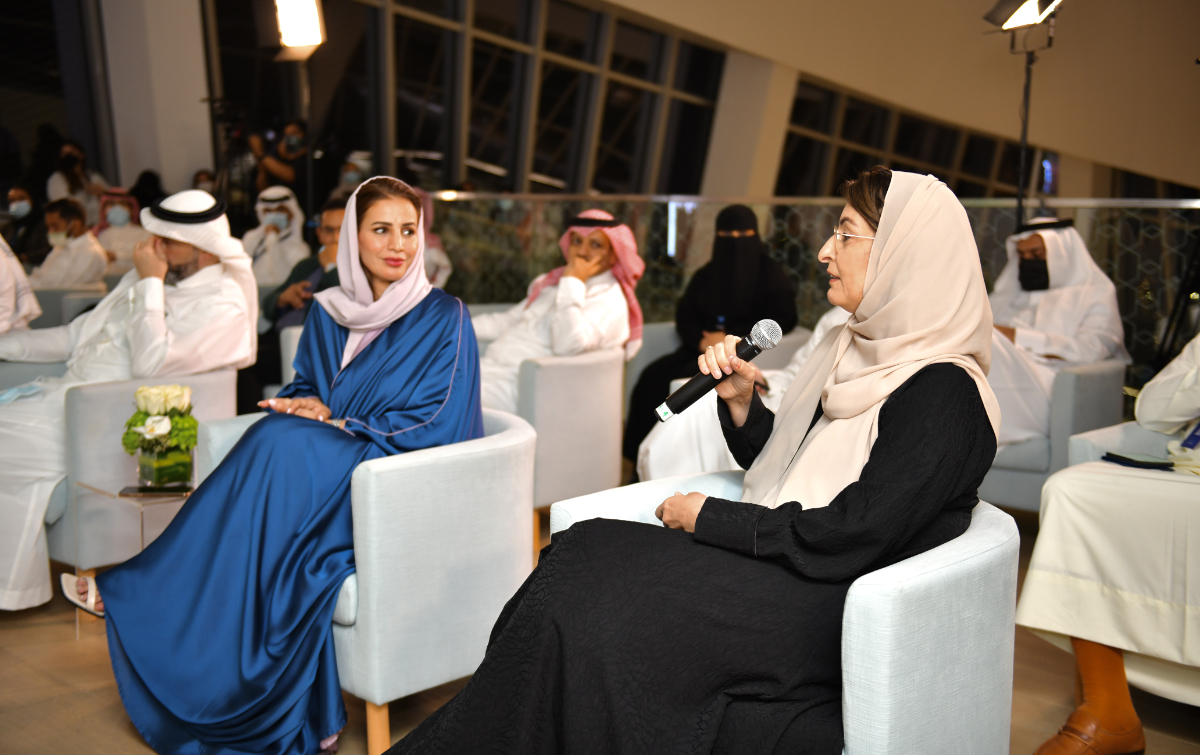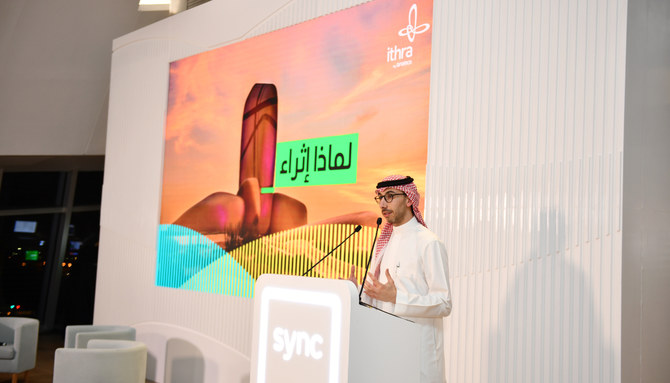DHAHRAN: Three out of four people in Saudi Arabia say they lose sleep because of their phones, a major initiative on digital health has been told.
The Sync program staged by King Abdul Aziz Center for World Culture (Ithra) on Tuesday highlighted the growing issue of digital overuse in an increasingly digitized world.
The initiative comes as digital overuse and screen addiction are blamed for problems ranging from behavioral disorders in children to insomnia in adults — issues that appear to be growing as technology spreads into all areas of our lives.
Among the well-being program’s aims is to “draw a line between the digital world and the real one.”
The wide-ranging program featured multiple workstreams and seminars on technology overuse, with perspectives from a range of disciplines including, sociology, psychology, science and neurology.
A discussion panel was moderated by cultural adviser Tariq Khawaji, and featured Mohammed Al-Hajji, director of the Behavioral Insights Unit at the Saudi Ministry of Health, and Heyla Al-Selim, professor of social psychology at King Saud University.

The panel saw a debate between Al-Hajji and Al-Selim take place, with the former shedding light on the risks caused by technology from a medical and neurological point of view, while Al-Selim drew attention to the positive and effective side of technology.
Al-Selim told Arab News that social media has helped reveal the true identity of the Saudi community by breaking down the walls of private life.
“We don’t have to only see the dark side of the issue, and we can’t deny that (social media) has helped the Saudi community share and communicate more, especially the youth and those eager to express themselves,” she said. “This explains how it helps in cultural exchange, such as Saudi people being fond of Japanese culture.”
Al-Hajji discussed how daily habits resulting from phone addiction affect the neuroplasticity of the brain, saying: “I think the average time of daily phone use varies from six to seven hours for each one of us for 365 days. It can actually change the anatomical structure of the human brain in the long run, and that rings the danger bill.”
Sync’s program director, Abdullah Al-Rashid, said that research for the program began almost a year ago, with 75 experts from nine countries, including the US, UK, France, Belgium, South Korea, Japan and China, collaborating in order to understand the latest thinking on the topic.
“We carried out landscape mapping of all the available research on the subject and then launched one of the largest global studies in 30 countries. We were able to study 15,000 people, and that formed the basis of this program,” he said.
Al-Rashid said that research showed that the vast majority of people are a lot more connected to their phones today than they were two years ago.
“Half the global population, one in two people in the world, say they lose sleep because of their phones,” he said.
In Saudi Arabia, the figure is even higher. “Almost three out of every four people in Saudi say that they have lost sleep because of their phones, and that is only one data point — there is a wealth of data yet to be revealed.”
The program also aims to raise awareness of the problem, encourage people to practice good digital habits, and provide international leadership for a post-pandemic digital world.
“This project has come out of something we are all aware of — technology is permeating our lives. We see it in our daily habits, in the behavior of our loved ones and in society,” Al-Rashid said. “But it also has brought us a lot of benefits, especially during the pandemic.”
The program combines research and good practice to help people use digital technology without allowing it to control their lives or cause damage that can lead to physical and mental issues.
“This extremely fast acceleration and adaptation has affected our identity, culture and language, even the words that we use,” Al-Rashid said.
“As a cultural nonprofit center, our aim is to study this phenomenon, and the implications of technology’s rise not only for our inner personal well-being but also for society at large.”
During the launch, Ithra viewed a video that showed children’s responses when asked about the amount of time they spend on tablets and phones, and about the behavior of their parents regarding phone overuse.
Dr. Hanan Al-Shaikh, a pediatric consultant, said that digital balance is “extremely important,” and that children should be included in the conversation, too. “One of the rights of children is to use technology; it is a worldwide need. However, it is really crucial to be aware that many kids are being harassed and bullied online. Thus, we as parents should teach kids about digital citizenship that protects their privacy from being digitally exploited.”
Research carried out for Ithra by ASDA’A warns that the overuse of technology has become a concern both at the regional and international levels.
Highlights:
• Studies show that 41 percent of technology users find it difficult to focus on everyday tasks.
• More than 3 million people use meditating apps to overcome insomnia, research shows.
• Almost 50 percent of technology users experience sleeping disorders.
And according to ASDA’A research:
• 40 percent of Gen Z respondents — people born between 1995 and 2012 — have misled their friends and family about their internet usage.
• The public in South Asia and the Middle East, and people within Gen Z, are the most likely to spend more time online than they actually want to.
• Online harassment and bullying affects about 34 percent of the public in the Middle East and North Africa.
• Some people use social media in an individual way, by exploring publications without interacting or commenting, which can lead to feelings of loneliness.
• Receiving a social media notification on our phone can lead to “reward anticipation” and a dopamine hit. Another hit is activated if the message is pleasant (eventually, the anticipation of a reward is enough).



































